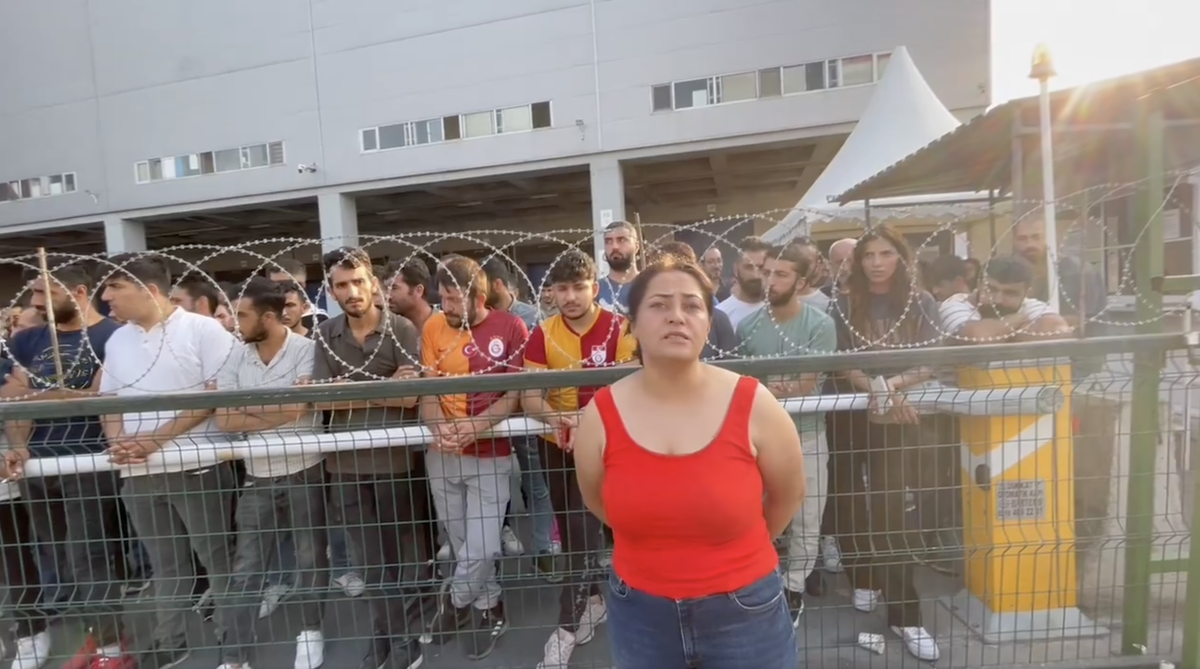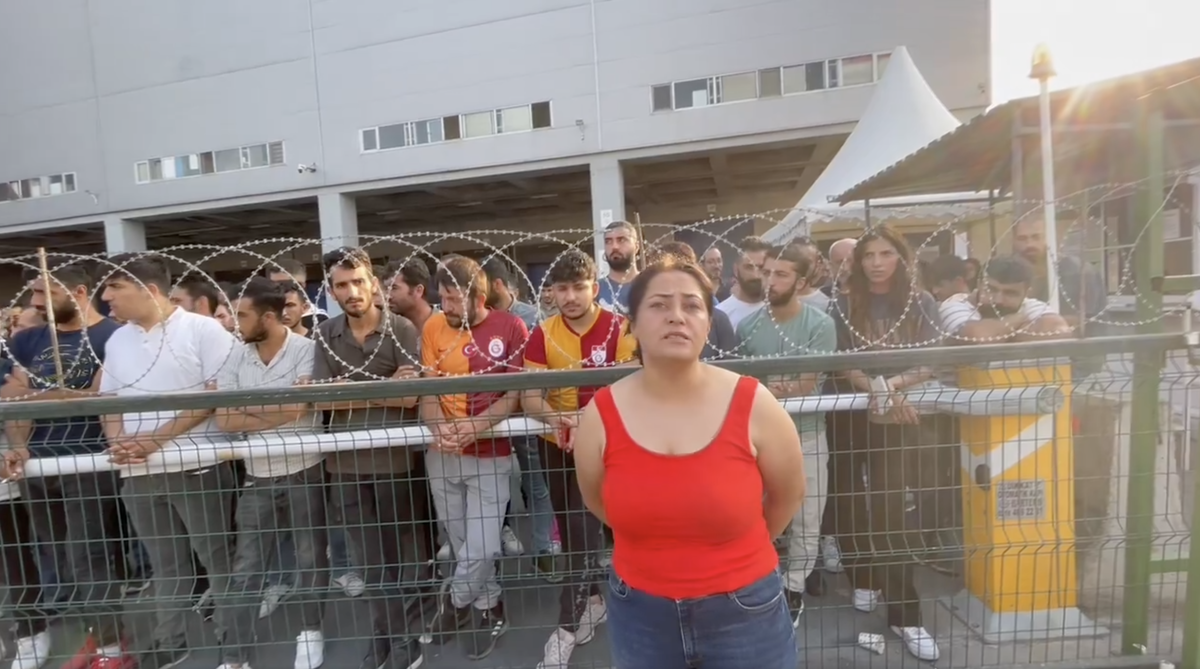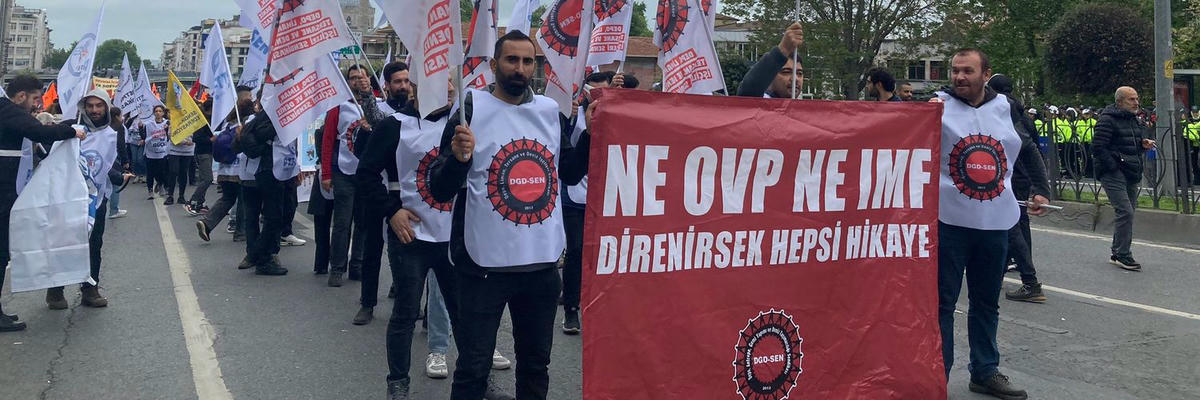“There is an uneasiness like a birth pain”


At the age of 10, she witnessed the deaths of child workers like herself in the textile industry and began to accumulate anger, and then there is the anger that was added at first contact from the areas where she was involved in organizing work. We talked to Acar about workers' movements, the reasons for the inactivity on the one hand, and of course what it is like to be a “mustache-less” chairperson in such a male-dominated industry, and what it is like to lead as a woman.
Let me ask the most basic question without beating around the bush: What convinces you otherwise, where do you get your strength from, in such days when people feel powerless against this order, there is no belief in changing it, and there is nothing other than the concern for survival?
There is an atmosphere of despair, but it is also a time when people's anger increases. When this anger cannot find a channel to flow, when it cannot act in a more compact manner, it becomes introverted. I spend 24 hours with workers, especially young workers; I see them all.
What kind of life is imposed on young workers, what is their connection with life and their mood?
In the last ten years, workers in general have become much younger. Young people who stayed in villages and rural areas could not survive there and migrated due to education or poverty. We are faced with an anger among young workers that I have never seen before, as futurelessness is experienced more intensely in big cities. For example, 90 percent of the Carrefour resistance were workers under the age of 30; It was the same in the Migros resistance and most recently in Soma. Their anger is not limited to a boss firing them, which is effective, of course, but they express uneasiness about every aspect of life. Because of this, they can confront the boss, the police and the state more harshly. This is a line that extends from education problems to lack of shelter, from not being able to make a living to demanding freedom. There are many university students who have dropped out or frozen their studies. They became warehouse workers, imprisoned in the horrible working conditions of the mines. While he wanted to avoid the same fate as his father, he was pushed into much worse conditions. We see that class anger increases when education increases or when they compare other lives with their own on social media.
 Neslihan Acar
Neslihan AcarHow does the evolution from that despair to the opposite pole, that rupture occur?
It's about contact. If he comes across respected, pioneering figures in the workplace or in the neighborhood, and if that channel is open in him, he moves on from there. For many years, the parties that workers vote for have been discussed, it is said that there is no class left, it is emphasized that workers need a vanguard party. What I have seen is that the consciousness of the worker, which he/she has gained through experience in his/her life, is very easily revealed around the right leadership. The Carrefour workers first went to Tez-Koop-İş and when they were told about the collective agreement, the anger subsided and the space for action narrowed. When we went and told them that even without waiting for a collective bargaining agreement, at least the working conditions that humiliate their dignity can be changed, the worker clings to it. Their anger becomes meaningful, it becomes collective.
At what age and where did you start working? Do you remember the day you held the first money you earned in your hand?
I started working in textiles when I was ten years old. I didn't see any salary or money until I was 16 because I worked under the supervision of my parents. (laughs) In textiles they give children dangerous jobs because they have good eyesight, stain removal with chemicals, working as an errand boy/girl... It is the child workers who fainted, whose lungs withered, were poisoned and died because of those chemicals that built my anger. What revealed it was the fact that I came across revolutionaries around me, at school. My family took a position not to make us suffer their own fate, but with three children, migration to the city, and poverty, it is not enough, children become workers. If one of the children continues education, the other cannot. That's why I finished high school and my two sisters studied at university.
How did you cross paths with Umut-SEN?
At the age of 18, our paths crossed with Başaran (Aksu) thanks to Bir Umut Derneği. I was a worker in a store in Kartal at the time, and I also took part in the discussions of Umut-Sen.
DGD-SEN represents a very male-intensive line of work, how do you experience this, considering the way gender roles function?
I was the organizing secretary in the previous term, and when I became the president, I had a hard time at first. A woman vanguard doesn't seem normal to men. They have a leftist leadership model with a tall figure, loud voice and mustache. On the one hand, you also have to struggle with masculinity. But the stronger you get from the inside, the more confident you become. To be honest, now I don't have any difficulty in establishing authority in front of a group of male workers, this is related to my political empowerment. There is also such a difficulty, you can suddenly look like a mother or a sister. Young workers can pour their whole lives into you and convey all their traumas. This is very difficult sometimes, male friends do not face this, they just talk about whatever the subject is. You improve the way you manage this over time. I used to have crying spells. Since the experiences were similar, it triggered me too. I am learning to look from a more outside perspective.
The current workers' resistance, many of which are organized under the umbrella of Umut-SEN, are very valuable, they are even more valuable because they interfere with the flow of life in such a process, but when you think about them individually, an incomprehensible policy of impoverishment is being carried out, the usurpation of rights is increasing day by day, mockingly. How do you interpret this unbalanced general silence in the face of this multifaceted and horrific attack? What is preventing it, what is missing? What are your predictions for the times ahead?
It is the same for the right-wing, it is the same for the fascists, it is the same for our side, people know with historical wisdom who to stand by when their rights are violated or when they are attacked. I think this despair is related to the left. We are in a process where the left all over the world is in an ideological confusion, where socialism has been defeated, where a narrative has become obsolete and in the last period everything has been confined to parliament. At the resistances we shout where is the minister, where is the deputy, but this is a form of exposure, otherwise we don't expect anything from there. Ultimately, the left builds its entire field of action here. For example, there is a retired people's movement, what is proposed to them is to force the parliament for a law with a movement similar to EYT. It is completely wage-oriented. As if the problem will be solved if the pensioners' salaries reach the minimum wage level.
Here, there is both the inability to make a living, workerization, and a view that increasingly devalues them and sees them as masses expected to die. All retirees are mentally ill, all are depressed. Universities are opening, and while young people have a lot of problems from nutrition to housing, the left, except for a few leftists, does not see these problems. Today, the worker is under attack not only in terms of working conditions, but also from his village to his neighborhood, from housing to nutrition, his total living space is being attacked. But there is a mass of workers much ahead of us, they have been coming together spontaneously since 2020, without expecting anything from anyone, they are studying, they are improving themselves. It will explode whether we are there or not. It can act within the establishment or its anger can be absorbed. The issue is in the leadership of the left. Now there is a restoration process through the CHP, and the left has taken a position here. Özgür Özel is making claims about labor and trying to fill the space left empty by the left, but there are serious disappointments.
The workers were in custody for two days, Özgür Özel, who comes to Soma every day, was in Manisa and could not be reached even by phone. The miners were there for seven days and there were no visits from the left. The left moves as much as the CHP opens up space. We experienced this with the Carrefour resistance, they tried to suffocate it. The situation of the confederations is clear, they have completely closed their doors as if there is no demand outside their one and a half million members. In general, there is the unhappiness of not being able to channel the anger somewhere, there is a uneasiness like birth pains.
If there is pain, there is a birth?
It would not be right to oracle, but I must have been to twenty cities this year, and there are things we have seen. Examples of gains have been weak for two years, they have been holding on with patches and pressure after the resistances, but it cannot go on like this. Taxes are increasing, there is a serious transfer of wealth, everything is planned on robbery. There is cohesion among unionized workers, the reaction against yellow unionism is rising. Public workers, public subcontracted workers, municipal workers... Four thousand people rose up in Seydisehir. Peasants and farmers everywhere... I don't know when, but naturally it has to flow somewhere. It is already flowing, and very militant resistances are taking place. A left that focuses on the basins and this anger is necessary; when it is positioned around the establishment parties, the existing one is reinforced.
There are the activities of your union and other actions of Umut-SEN. In addition to the serious physical and mental labor, there is also the emotional labor you described. Is there a moment when you are alone with yourself, what do you rest your mind and body with?
I don't rest. (laughs) My 24 hours are programmed according to the struggle, there is no space outside of it, there is no other life that I have created for myself. The way to get out of here, to overcome everything that squeezes you, is to insist on these places. In order not to drown in practice, at most you take a day for yourself to read a book. The way to get rid of this burden is like taking on more burdens right now.



